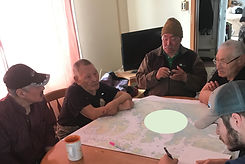POLAR BEAR QUOTA REDUCTION IMPACTS
IN GJOA HAVEN
Polar bear management policies in the last two decades, including a moratorium and very limited numbers of polar bear hunting tags, have disproportionately impacted Gjoa Haven compared to other communities in terms of livelihoods and inter-generational knowledge mobilization
GJOA HAVEN: VOICES OF THUNDER
‘We seek acknowledgement and apologies for suffering the consequences of the quota regulations; a loss of culture and knowledge, as well as increased danger due to rising number of polar bears around their communities. Inuit knowledge in terms of accuracy and inherent value needs to be recognized and better acknowledged. We want better integration of Inuit knowledge in survey research, like for example accounting for seasonal changes. Scientific monitoring surveys have limitations, we ask that researchers will recognize and take Inuit observations more seriously.




IMPACTS: ONE PAGERS
Gjoa Haven is seeking recognition; ‘We want these ‘‘voices of thunder to echo everywhere’’.
These stories should finally come out. There are two generations lost and ‘’millions of dollars’’ in sportshunting. We want everyone to hear us. ‘’We’re tired of waiting’’.
VOICES OF THUNDER; A TESTIMONIAL READING
This academic paper, targeting academics and other scientists active in Nunavut invites fellow scholars and colleagues to join in a testimonial reading of the quota reduction impacts as testified to by Gjoa Haven’s community members.
THIS IS URGENT!
WE ARE LOSING IMPORTANT KNOWLEDGE OF THE LAND
Inuit have a relationship with the land all year through. We know the land and the ice, and how it changes over the seasons and the years. This knowledge is passed on between generations, in songs, dance, and stories - but also by an ongoing relationship with the land through hunting. Our relationship with the ice and the land changes when we can't hunt polar bears, and important knowledge on ice conditions is lost.




KATHY KEKNEK & JANET AGLULLAK
YOUTH FILMING ELDERS
INTERVIEW GEORGE KONANA
INTERVIEW JAMES QITSUALIK
WINDS OF CHANGE
PATHS FORWARD



